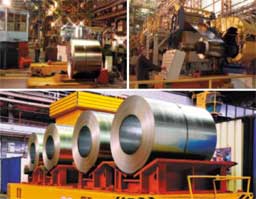Tuesday 17 July 2012
ArcelorMittal Agrees Temporary Pay Deal with Kazakh Workers
Keywords:
ALMATY (Reuters) – ArcelorMittal, the world’s largest steelmaker, said it will return to the table in October after agreeing a temporary pay deal with its Kazakhstan plant workers to avert a threatened strike.

- ArcelorMittal Telirtau is the largest enterprise in mining and metallurgical sector in Kazakhstan. It is an integrated mining and metallurgical complex with own coal, iron ore and power base.
ArcelorMittal in Kazakhstan specializes in the manufacture of flat an long products, including polymer-, zinc- and also produces sinter, iron ore and coal concentrate, coke, pig iron, steel, including continuous casting slab, strip, spar strip, electro-welded pipes and coke-chemical and blast furnace joint products.
ArcelorMittal Temirtau produced 3.68 million tonnes of crude steel in 2011, up from 3.34 million tonnes in 2010. Rolled steel output rose to 3.17 million tonnes from 2.92 million tonnes.
ArcelorMittal Temirtau, the company’s Kazakh unit, awarded a 10.4% pay increase to its steelworkers backdated to Jan. 1. A local trade union representative said the deal, which fell short of workers’ demands, was a temporary measure. “Naturally, we are dissatisfied with the agreement. This is just a stopgap measure,” Valentina Shepelenko, a member of the steelworkers’ strike committee, told Reuters by telephone. The rise includes a 7.4M% inflation adjustment for last year, the company said. Those workers whose monthly wage after the rise is between 60,000 and 70,000 tenge ($400-$467) will receive an additional 5,000-10,000 tenge every month.
The steelworkers’ trade union staged a three-hour warning strike in June, the first stoppage at the plant, and threatened open-ended industrial action should its demands for a 30% pay rise and a halt to job cuts not be met. At the time, the union rejected an offer of a 10% pay rise which had been accepted by the coal miners’ trade union. The Soviet-era steel mill in the central Kazakh city of Temirtau employs around 17,000 people and has added symbolic significance because President Nursultan Nazarbayev worked in its blast furnaces for nearly a decade.
Monthly wages at the plant average 115,000 tenge, above the national average of about 99,000 tenge, but union leaders say that up to 70% of steelworkers in Temirtau receive less.
ArcelorMittal Temirtau faced a sudden shock to demand this year when Western financial sanctions on Iran closed the door to a market that accounted for a considerable portion of the mill’s sales last year. It has shifted some of its sales to former Soviet countries and western China in an attempt to compensate for lost volumes.

